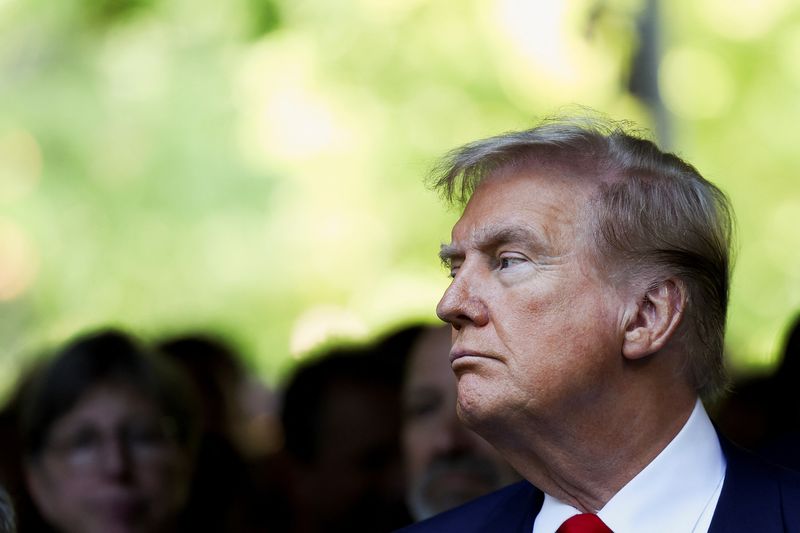By Michael Martina
WASHINGTON (Reuters) - As he campaigns for a second term, former president Donald Trump has made a tough stance toward China central to his pitch on foreign policy.
But if Trump is elected on Nov. 5, both he and China's leaders would confront an awkward reality: many of the top candidates for foreign policy jobs in a Trump administration are sanctioned by China and barred from the country.
Soon after President Joe Biden took office in 2021, China took the unprecedented step of sanctioning 28 former Trump administration officials for their roles in what Beijing saw as anti-China policies, in a gamble that the former president's days in the White House were over.
The sanctions, which include bans on traveling to China, apply to former officials including Trump's Secretary of State Mike Pompeo, who Beijing has called a liar and a "clown," and former national security adviser Robert O'Brien.
Pompeo has not ruled out working for Trump again, and sources with knowledge of Trump's relationship with O'Brien say he is likely to play a significant role in any second Trump term. Opinion polls show the election race between Republican Trump and Democrat Kamala Harris is essentially tied.
At a minimum, China's openly hostile relationships with potential decision makers in a second Trump administration would raise questions about how the U.S. and China might navigate what both countries have described as one of the world's most important bilateral relationships.
"This problem is a new one for China," said Wu Xinbo, director of the Center for American Studies at Fudan University in Shanghai. "If these previously sanctioned officials return to the U.S. government, I think from China's perspective it is very unlikely that the sanctions will be canceled immediately."
But Beijing would have to address the problem, say experts and former Trump administration officials.
"They will have to back down, otherwise there won't be any dealings with the CCP (Chinese Communist Party)," one former Trump administration official who still works for the U.S. government and has been sanctioned told Reuters. The person spoke on condition of anonymity due to sensitivities around who might get jobs in a new Trump administration.
China's embassy in Washington declined to comment.
"President Trump will put America first by selecting officials for his administration that he deems are best fit to serve the American people - whether China likes it or not," Trump campaign spokesperson Karoline Leavitt told Reuters.
SANCTIONS FOR "CRAZY MOVES"
In January 2021, China sanctioned 10 former Trump officials by name for "crazy moves" it said "gravely interfered in China's internal affairs."
In addition to Pompeo and O'Brien, China hit Trump's top diplomat for East Asia David Stilwell, former White House economist Peter Navarro, and Keith Krach, an official who raised Beijing's ire when he visited Taiwan in 2020, among others. Some, including former national security adviser John Bolton, have had public splits with Trump, making a return in a second administration unlikely.
China sanctioned another 18 people at the time without disclosing their identities.
Many of these helped implement Trump's aggressive, if chaotic, approach to China, underscored by waves of tariffs that plunged the two countries into a trade war, and a declaration that Beijing was committing genocide against Uyghur Muslims.
Chinese officials are most openly antagonistic toward Pompeo, who visited Taiwan in 2022 as a private citizen and called for the U.S. to recognize the island as a country, prompting Beijing to say the "former politician" bankrupted his credibility.
China claims Taiwan as its territory, and the issue is a red line in its relations with Washington.
Pompeo has suggested he would consider working in a second Trump administration. At the Republican National Convention in July, he said it was his "greatest honor" to have served under Trump and labeled China the United States' "greatest threat."
Pompeo and O'Brien did not respond to requests for comment.
FINDING WORKAROUNDS
Sanctions on officials have previously roiled U.S.-China diplomacy.
The U.S. had sanctioned former Chinese Defense Minister Li Shangfu, creating a months-long impasse in 2023 during which China refused meetings with U.S. Defense Secretary Lloyd Austin. The issue was resolved when China ousted Li over a domestic corruption scandal.
Complicating matters this time is Beijing's move to deter U.S. sanctions with its 2021 Anti-Foreign Sanctions Law, said Jack Zhang, an expert on Chinese sanctions at the University of Kansas.
"This ties their hands and makes it harder to walk back than a private travel ban," Zhang said.
Workarounds are likely, however.
Those could include both sides seeking third-country sites for meetings instead of playing host in their capitals.
Beijing might also try to engage Trump administration surrogates through back channels or selectively agree to meet non-sanctioned officials, said Craig Singleton, a China expert at the Foundation for Defense of Democracies think tank.

China could also temporarily waive the restrictions, something the U.S. has been known to do, said Ivan Kanapathy, a former White House National Security Council official during the Trump administration.
"For Beijing, it would be even easier for leadership to send a signal to the bureaucracy (to meet with U.S. officials), since politics always trumps the rule of law there."